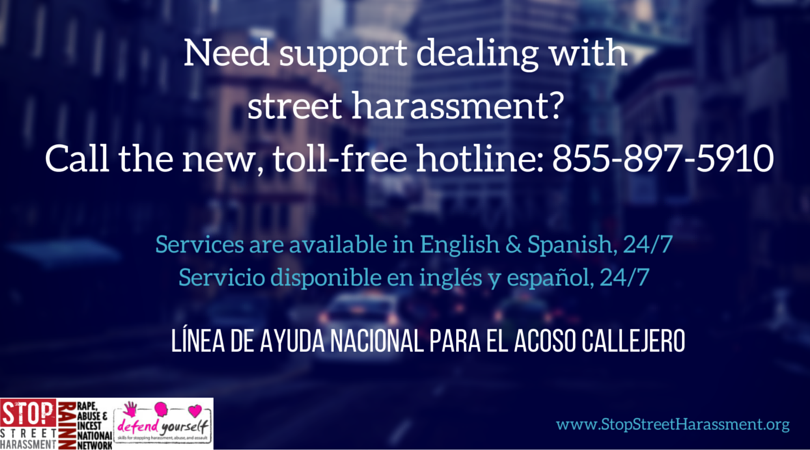Here’s a street harassment survey being conducted by our friends Hollaback România – ia atitudine împotriva hărțuirii. It will be the first national study in the country.
The survey closes Aug. 31! You must be Romanian to take it.
Making Public Spaces Safe and Welcoming
By HKearl
Here’s a street harassment survey being conducted by our friends Hollaback România – ia atitudine împotriva hărțuirii. It will be the first national study in the country.
The survey closes Aug. 31! You must be Romanian to take it.
By HKearl
Here are two stories that make me cheer!
“They say New Yorkers are tough. But even by big city standards, nobody is as fierce as Deanna Carter, a woman who recently busted out her phone and confronted a man who tried to masturbate in front of her on the subway.
‘Rubbing your dick? What the fuck are you doing?’ Carter shouts in the mobile video. ‘Do it again and I’m gettin’ up out this chair and I’mma bust your fuckin’ ass on this train … you rub your dick when you get off the motherfucking train. Do we fucking understand each other?’
The man nods slightly, but Carter isn’t satisfied. So she tells him to get off the train at the next stop.”
“French brand Vodka Mariette has taken a stand against street harassment with a new campaign that will see its delivery drivers sign an oath to never engage in catcalling….
In a bid to raise awareness of the issue and “set an example of proper conduct”, the brand – a French girls’ name that translates as ‘little rebel’ – has launched its ‘Yes to Vodka, No to Catcalling’ initiative that will require all truck drivers transporting Vodka Mariette to sign the ‘Drivers of Change Oath’.
The oath, which reads as follows, has been made public in the hope that other brands will follow suit: “I, the undersigned, agree to never be engaged in behaviour considered ‘street harassment’ or ‘catcalling’ towards any individual at any time. Such actions are defined as, ‘unwanted comments, gestures, and actions forced on a stranger in a public place without their consent and is directed at them because of their actual or perceived sex, gender, gender expression, or sexual orientation’. I understand that signing below is purely a good gesture moving forward and is in no way an admission of prior poor conduct.”
By HKearl
I’m excited to share that the online option of the National Street Harassment Hotline launches NOW!
Anyone in the USA can visit the online hotline to receive help over secure, anonymous IM chat. It is compatible with smartphones, tablets, computers and other internet-enabled devices. And there are options in English & Spanish.
Please help spread the word on social media. Here is a direct link to the Street Harassment Hotline page: http://tinyurl.com/TheSHhotline
And here are direct links to the online hotlines (and both of these links are accessible via the above link):
We need YOUR HELP to spread the word to make sure more people know about this free service. Here are two things you can do:
The Hotline is fully funded by individual donors. Help cover more call time with a tax-deductible donation today! A mere $11 covers 15 minutes of call time.
By HKearl

3.5 years after the idea for a street harassment hotline was hatched and six months after a plan was formed, I am thrilled to share that as of TODAY, anyone in the USA can call toll-free for support, help and advice about street harassment. The service is available 24/7, in English or Spanish.
855-897-5910
Help Spread the Word:
More about the Hotline:
Stop Street Harassment has partnered with the Rape, Abuse & Incest National Network (RAINN) and Defend Yourself to launch the first-ever national street harassment hotline.
The phone service starts TODAY, July 19 (call: 855-897-5910), and an online (through secure IM) option will be available starting on August 10 via www.StopStreetHarassment.org.
The services both will be offered 24/7, in Spanish and English. People will be able to find emotional support, get advice for how to deal with harassers, learn what their legal rights are, and more.
Everything is in place – now we just need to spread the word so people know about it!
Many thanks to the 50+ people who donated to make it possible, to our Spanish language translation volunteers, to our graphics design volunteer, and to Defend Yourself and RAINN for partnering on this. It would not exist otherwise!!
By Contributor
Patrick Ryne McNeil, SSH Board Member
 This is a fact: LGBTQ people experience public harassment – and according to our spring 2014 report, LGBTQ people in the United States are more likely than straight, cisgender people to report experiencing it (both verbal and physical forms). The sample size in our research forced us to group the entire LGBTQ community into one category. While this lumping is not ideal and cannot account for the ways that intersecting identities lead everyone to experience the world differently, it did show that queer people – as past research has shown – are victims of public harassment.
This is a fact: LGBTQ people experience public harassment – and according to our spring 2014 report, LGBTQ people in the United States are more likely than straight, cisgender people to report experiencing it (both verbal and physical forms). The sample size in our research forced us to group the entire LGBTQ community into one category. While this lumping is not ideal and cannot account for the ways that intersecting identities lead everyone to experience the world differently, it did show that queer people – as past research has shown – are victims of public harassment.
Preliminary findings from the 2015 U.S. Transgender Survey, out this month from the National Center for Transgender Equality, show that trans people face one particularly dangerous form of public harassment: the kind that takes place in public restrooms.
According to the preliminary results:
These findings should concern and anger everyone. In the same way that street harassment can force women and other marginalized communities into making consequential life changes – like adjusting their commute, moving homes, or switching jobs – harassment of trans people in public bathrooms, as the survey shows, can cause them to avoid using public facilities or can discourage them from drinking or eating in the first place. Those are harmful choices that no one should have to make.
While 12 percent reported experiencing harassment, attacks, or sexual assault, 59 percent have avoided restrooms because they’re afraid it will happen to them. That fear – even in the absence of harassment – is unhealthy. And bills popping up across the country to restrict restroom access aren’t helping.
The full U.S. Transgender Survey will be released later this year.
Patrick works in communications at The Leadership Conference on Civil and Human Rights, where he writes on a range of social justice issues. He is a board member of Stop Street Harassment and he wrote his thesis on the street harassment of gay and bisexual men at the George Washington University. He was awarded SSH’s Safe Public Spaces Trailblazer award in 2013 for his street harassment-related work.